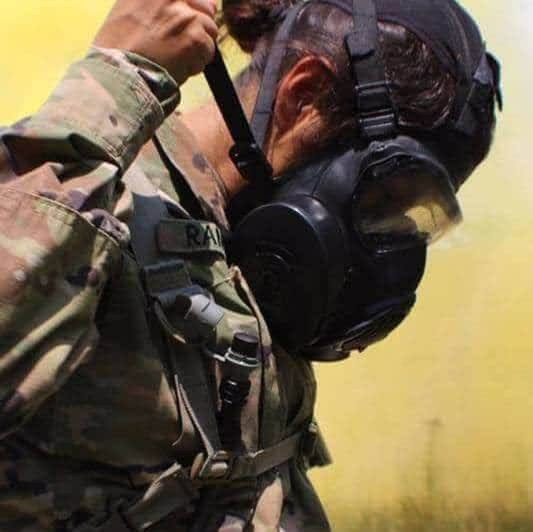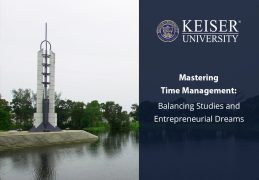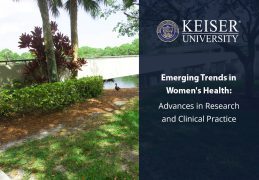From the bustling streets of her hometown in Mexico to the demanding training grounds of the U.S. Army, SPC Johana Ramirez’s journey began with a steadfast resolve to advance her future. Driven by the pursuit of better opportunities, she traveled from the Mexican border to the United States and enlisted in the U.S. Armed Forces. Now a student in the Latin Division at Keiser University, she is one of the Latino Veterans who contribute to our national security.
According to USA Facts, in 2022, Latinos comprised 18% of the Army’s population, a statistic that Ramirez was a part of. Born and raised in Mexico, Ramirez had learned English in her native city. However, her linguistic skills were tested upon arriving at basic combat training.
“When I entered the Army, I passed the English exam, which meant I wasn’t sent to English school,” Ramirez recalled. “However, the real challenge began at boot camp. My role as a chemist was demanding, and I faced many challenges because I did not understand the instructions. They were more severe with me because they said nothing is difficult or impossible; everything can be done in a good or bad way, but at the end of the day, you will do it,” she said.
In boot camp, Ramirez met her future husband, SGT José Sanchez from Puerto Rico, who was assigned as her battle buddy. Unlike Ramirez, Sanchez had an advantage: he had lived in Boston for a while, which allowed him to join the Army with English skills.
Ramirez and Sanchez are part of the growing Latino contribution to the military. Latinos have a significant presence in the military with the Marine Corps having the highest percentage of Hispanic or Latino members with 26%, followed by 18% in the Army and Navy, and 17% in the Air Force.
After serving the Nation
Following her service, SPC Ramirez faced physical disabilities; despite this, she wanted to take advantage of her free time and started searching for academic options to continue her studies.
“I realized there is a program here called Veteran Readiness and Employment (Chapter 31), and I could check universities. Then I started looking for careers and said, ‘I didn’t want to forget Spanish. I will look for Universities in Spanish,’ and I found Keiser University.”
Keiser University’s online format proved invaluable for Ramirez, allowing her to balance academic responsibilities with her medical treatments. Encouraged by her positive experience, she also persuaded her husband to enroll. Ramirez is pursuing a Bachelor of Science in Interdisciplinary Studies focusing on Marketing in the Latin Division, while her husband is studying for a Bachelor of Arts in Homeland Security at the Online Campus.
“I told him, ’Look, I am at this university, and you should try it.’ He was looking for other universities, and they had precisely the same problem: they do not offer the flexibility to continue doing your treatments and to be able to study,” She empathized.
Now residing in Texas with their two daughters, the veteran couple continues to give back to their community. Ramirez, who improved her English skills during her service, dedicates time to helping fellow Latinos and veterans with language barriers.
“In the veterans organization, many soldiers don’t speak English just because they are in the service,” Ramirez explained. “I help them understand legal or medical documents and assist those who need help filling out forms. Whenever I encounter someone facing language difficulties, I offer my assistance.”
Outside of her veteran organization, Ramirez has run into the same issue at many other locations and is quick to offer assistance to those needing translation assistance.
“I’ve been in hospitals with people who can’t fill out a form, don’t know how to get there, or are struggling with the translator. I go to the front desk and ask them, ’Can I help you?’ When I’m not in medical appointments, I take advantage of the places I go and approach the people I hear who are struggling with the language,” Shared Ramirez.
A decision made in hopes of a better economic and academic future has resulted in triumphs, experiences, and lessons that are now part of her way of life forever.
“The Army taught me to give without expecting anything in return, to leave a lasting impact, and that helping others is more important than money,” she said.
About Keiser University:
Keiser University is a private, independent, non-profit university serving nearly 20,000 students at 21 Florida campuses, online, and two international sites. Co-founded in in 1977 by Chancellor Arthur Keiser, Ph.D., and Evelyn Keiser, the university now offers over 100-degree programs, ranging from associate to doctoral levels. As a designated Hispanic-Serving Institution, Keiser University is a member of the Hispanic Association of Colleges and Universities. In 2025, it was ranked No. 22 in the U.S. for Social Mobility by U.S. News and World Report.





